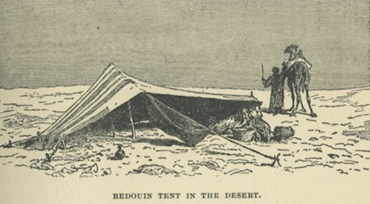
[Note: the following list of items for light camping in Arabia is provided by G. Wyman Bury for the early part of the 20th century.]
CAMP EQUIPMENT
Try to do without a tent. Arabs hate pitching tents after a long day’s march, and seldom pitch them well. They draw fire and afford no protection, while preventing your own observation; they also betray the site of your camp to bad characters and casual callers on the look out for supper.
BEDDING
Avoid Wolseley valises or anything with pleats and folds, which become the permanent abiding places of parasitic insects.
‘Blankets.’ One each for the men. A few extra for convalescents or invalided men. Two for yourself.
‘Pillows.’ Carry your spare clothes in a green canvas sack.
ARMS
Long rifles are cumbersome, and unpopular among Arabs.
Strength of permanent escort in proportion to the size of the expedition and state of the country. Remember that a few picked men who can shoot and keep their heads are better than numerous armed rabble, and a bad shot eats no less than a marksman.
No side-arms; each man wears his own dagger.
‘Personal weapons.’ Light carbine, magazine for choice; I suggest the .30 Winchester or a Savage. The tribal Arab is not a pilferer, but ammunition is an irresistible temptation; so use a caliber that is not likely to be useful to him. Remember that a ‘bolt’ mechanism is often a nuisance on horseback and apt to rattle when you do not want it to.
AMMUNITION
‘Permanent escort.’ Each man should carry 40 rounds in a bandoleer round his waist, and 60 rounds per man should be on your leading (and most reliable) camel, readily available. Another 100 rounds per man in reserve on another camel. Waste should be checked if it occurs, but the tribesman naturally husbands his ammunition. Remember, rounds unaccounted for ‘may’ be used some day against the civilization which reared you. Therefore count ‘empty’ shells,’ which a tribaql escort may easily be taught to retain even in engagement unless very hard pressed.
MOUNTS
‘Permanent escort.’ When with baggage camels your men should be a-foot. If moving rapidly on desert marches all should be mounted on side-camels. Buy or hire locally. They will cost from 10 to 20 [pounds currency] a head (to purchase), according to quality and supply available…
Arabs do not let horses out on hire, but will lend a pony for a short period to anyone they know. It is better to buy. 15 [pounds] should procure a useful animal. If he has plates on, insist on having them removed, and examine his feet before completing the purchase.
MISCELLANEOUS STORES
‘Oil.’ Rangoon, for cleaning arms, also Vaseline. Se that your men do not use it too recklessly on their hair, and do not let them clean their carbines with the crude sesame oil of the country. Inspect arms once a week, not oftener; the Arab looks after his weapons without being badgered.
PROVISIONS
A few tins of European food; enough to last you for the first week while you are gradually adopting native diet.
Your men’s rations are procurable locally.
MEDICINE
‘Quinine.’ (Carry a few azymes or capsules, if you cannot take quinine ‘au natural.’
‘Camphorodyne.’
‘Chinosol.’ (Compact antiseptic)
‘Epson salts. Eno’s Fruit Salt.’ For the treatment of natives, who consider that there is great virtue in the latter on account of its behaviour in water.
Get a doctor to give you a simple prescription for ophthalmic drops, and have this made up in Aden.
Bandages, boric lint, surgical scissors.
If you have any surgical knowledge certain instruments will suggest themselves. If you have not, you are better without them, but you might carry a pair of thorn-tweezers and a lancet.
DRESS
You may not be3 able to live up (or down) to native dress, which requires some years’ practice and a lot of tact to wear with even a passable attempt at decency, but you can at least harmonize with your surroundings. I would suggest as follows:
Shorts, – – – Khaki drill – 4 pairs
Shirts, – – – Same colour, but cotton – 3 pairs
Shirts, – – – Same colour, but flannel – 3 pairs
Shirts, – – – White flannel – 3 pairs
Turbans, – – – Khaki cotton or silk, 8 yds., – 2
Turban, procurable at Aden, Silk, for State occasions, – 1
(Black, crimson, and gold is the usual pattern for chiefs,)
A white shirt should be worn with this, in accordance with Arab etiquette.
Shawl, – – – Dark blue (tribal pattern) – 1
Procurable anywhere in the country. Boil it first to get some of the superfluous indigo out of it.
Sandals, – – – Any good European pattern to slip off easily when paying calls, – 3 pairs
Rope-soled boots (not shoes), Canvas uppers, – 4 pairs
To be worn with putties on the march.
Putties, – – – Plain, khaki, – 2 pairs
Knitted coat, – – – or ‘Warm coat (British),’ – 1
To Wear after sundown.
I suppose you will have to carry a handkerchief. Avoid white, and do not blow your nose in public: it startles folk.
Above all, avoid the ‘topi’ of civilization – goggles or a sun-umbrella. You will never be able to live them down.â€
[Excerpts from G. Wyman Bury, The Land of Uz (London, MacMillan, 1911), pp. 349-354.]
[Tabsir Redux is a reposting of earlier posts on the blog, since memories are fickle and some things deserve a second viewing. This post was originally made on July 12, 2007]